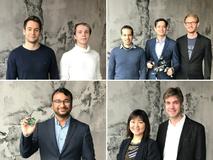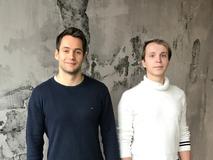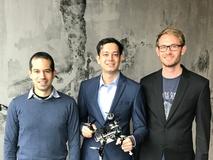Startups for Recruitment Lunches, Solar Panel Health, Drone-Landing AI, and Proton Therapy Visualization Win CHF 10,000 Each
30.10.2019
Learn about the teams behind Career Lunch, SmartHelio, SUIND and TERAPET, who've each won 10,000 francs, entrepreneurial support, and training from Venture Kick.
 Career Lunch, SmartHelio, SUIND, and TERAPET
|
 Career Lunch's Simon Hofer and Konstantin Nesterov
|
 SUIND co-founders Davide Scaramuzza, Kunal Shrivastava and Kevin-Kleber
|
 TERAPET co-founders Christina Vallgren and Marcus Palm
|
The quartet have six months to advance their business cases before their next Venture Kick jury pitch.
Career Lunch: matching candidates and corporate culture over a meal
Career Lunch: matching candidates and corporate culture over a meal
Traditional recruitment doesn't make it easy to assess a candidate's cultural fit or give prospective hires much insight into their possible future work and colleagues. Simon Hofer, Konstantin Nesterov and James Margrove -- graduates of ETH Zurich and St. Gallen -- are building career-lunch.com to pair potential hires and innovative employers for informal exchanges over lunch. Their service, which launched this month with a dozen employers at three of Switzerland's biggest universities, aims to give both sides more authentic opportunities to get to know each other.
SmartHelio: a simple, remote check on the health of solar panels
A typical Indian household could meet its electricity demand with less than 2 kW of solar panels installed on the roof. To make the decision to invest in solar easier, it's vital for homeowners to have a simple and low-cost way to monitor the health of their system -- a flaw in any single rooftop panel often reduces the output of the entire system. SmartHelio's graduates from EPFL and the universities of Lausanne and Geneva have built a device to monitor small-scale solar installation remotely, detecting faults and suggesting predictive maintenance via SMS. Teammates Frédéric de Goumoëns, Naomi Savioz and Govinda Upadhyay will focus on developing its modular technology for fast-growing solar markets such as in India, which plans to deploy 40 GW of distributed solar over the next 5 years, where existing remote monitors are too expensive for small-scale systems.
venturekick.ch/HelioHealth
venturekick.ch/HelioHealth
SUIND : sensors to land drones autonomously
It's difficult to land a drone safely and precisely in an urban environment. Until now drones' lack of environmental perception and the fallibility of GPS signals have slowed their deployment for autonomous deliveries in cities. The team from the University of Zurich and ETH's Robotics and Perception Group have applied a decade of computer vision and AI algorithm research to develop a sensor device that lets any commercial drone to land itself, even in low light conditions or around fast-moving obstacles. SUIND's patented tech is already being tested by drone delivery companies, as co-founders Kevin Kleber, Davide Scaramuzza, and Kunal Shrivastava target sales to a commercial drone industry that is expected to grow to $13 billion next year.
venturekick.ch/SUIND
venturekick.ch/SUIND
TERAPET: real-time tracking of proton therapy dosage-delivery
Proton radiotherapy uses high-energy particles to treat cancer. Currently, with no way to track live dosage-delivery, doctors either damage healthy cells by exposing more tissue than necessary, or reject patients who might benefit from treatment. To solve this, TERAPET's detector measures the gamma rays emitted as a by-product of proton therapy to make a precise, 3D-visualization of the treated region in real-time. The co-founding team of CERN-physicists Christina Vallgren and Marcus Palm, and Geneva University Hospitals' head radiologist Raymond Miralbell, hope their patented innovation will make cancer treatment safer, more precise and quicker.
Proton radiotherapy uses high-energy particles to treat cancer. Currently, with no way to track live dosage-delivery, doctors either damage healthy cells by exposing more tissue than necessary, or reject patients who might benefit from treatment. To solve this, TERAPET's detector measures the gamma rays emitted as a by-product of proton therapy to make a precise, 3D-visualization of the treated region in real-time. The co-founding team of CERN-physicists Christina Vallgren and Marcus Palm, and Geneva University Hospitals' head radiologist Raymond Miralbell, hope their patented innovation will make cancer treatment safer, more precise and quicker.


